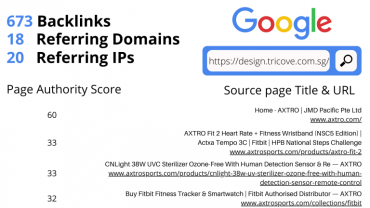What are backlinks?
Imagine you’re working on a project; what would your last few pages or slides of your report or presentation be about? References to sources that you incorporated in your content to give acknowledgement to the rightful owners, right? That is pretty much what backlinks are too!
A backlink is a link that directs readers to your website from another website. Consider it as a professional testimonial for your organization, as they must have believed your content was too good not to share with their audiences.
Why are backlinks important?
Backlinks play a crucial role in optimizing your website traffic as Google will rank your pages based on relevance and link popularity, as well as your expertise, authoritativeness, and trustworthiness aka the E-A-T score. In order to achieve higher rankings, Google needs to know if your content is valuable and that many audiences are loving it. In simpler terms, high quality backlinks coupled with more backlinks generated will result in higher search engine ranking.
If lots of people are sending their readers to your website, it is safe to say that your content stands out from the crowd and it is extremely relevant. Therefore, it is critical to check backlinks and develop a digital marketing strategy that enhances your website’s presence.

How to get backlinks?
Now that you know what backlinks are all about, the true question is, how do I earn quality backlinks? I know, it sounds tempting to get as many backlinks as possible, doesn’t it? Keep in mind, though, that quantity isn’t everything. Incorrect links can hurt your search engine rankings, which is why establishing a link building strategy is necessary. The technique of manually persuading people to link to your website from theirs is known as link building. When determining whether or not a backlink might be useful to your link-building strategy, consider these guidelines:

1. Relevance
Backlink opportunities from pages directly related to your products or services may come easily to you. But nothing in life comes as easy. You would almost certainly be unable to obtain backlinks that are ideally tailored to your organization’s offerings. Keep an eye out for backlinks that aren’t directly related to your products or services as well.

2. Authority
Third-party tools such as Ahrefs and Open Site Explorer are lifesavers when it comes to determining the authoritativeness of your website, as the only other option is to manually go through the process to ascertain a page’s ranking. It is a much seamless process and saves you a lot of time. And since none of the tools available today are perfectly aligned with Google, there is no harm in using more than one.
3. Editorial Standards
As previously said, quality matters over quantity. A site that is selective on the backlinks it gives can provide you with more backlinks. No one will be impressed by a site that is unduly generous with backlinks. Hence, be mindful of sites that have actual editorial standards. Though it will take longer to get accepted immediately, it will definitely be worth the wait.
4. Indexing Statuses
Backlinks from sites that aren’t indexed are a waste of time. It will never appear in organic search engine results if they aren’t indexed. Sites will only get indexed when Google’s crawler visits and explores them, following links to discover what is there. Each page it finds will contain either an index or a no-index meta tag, and the spider will file it in that appropriate index (or not) accordingly.


